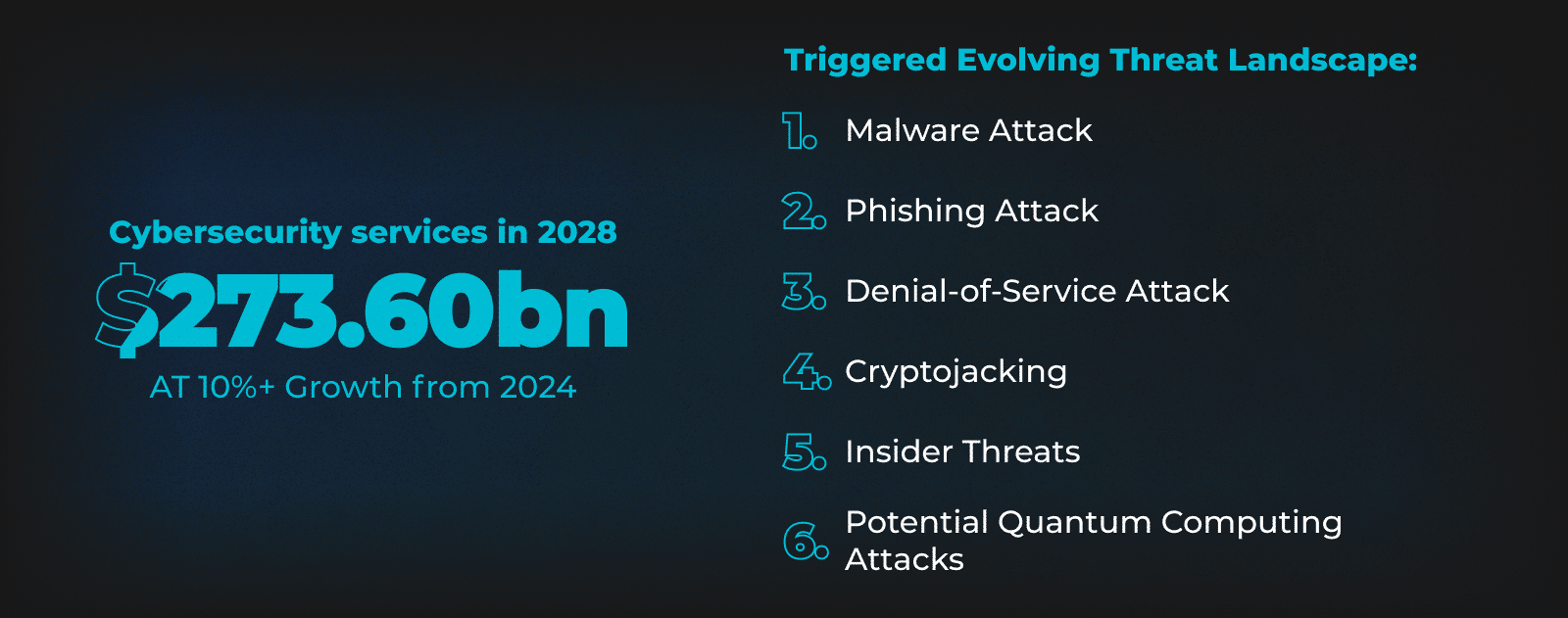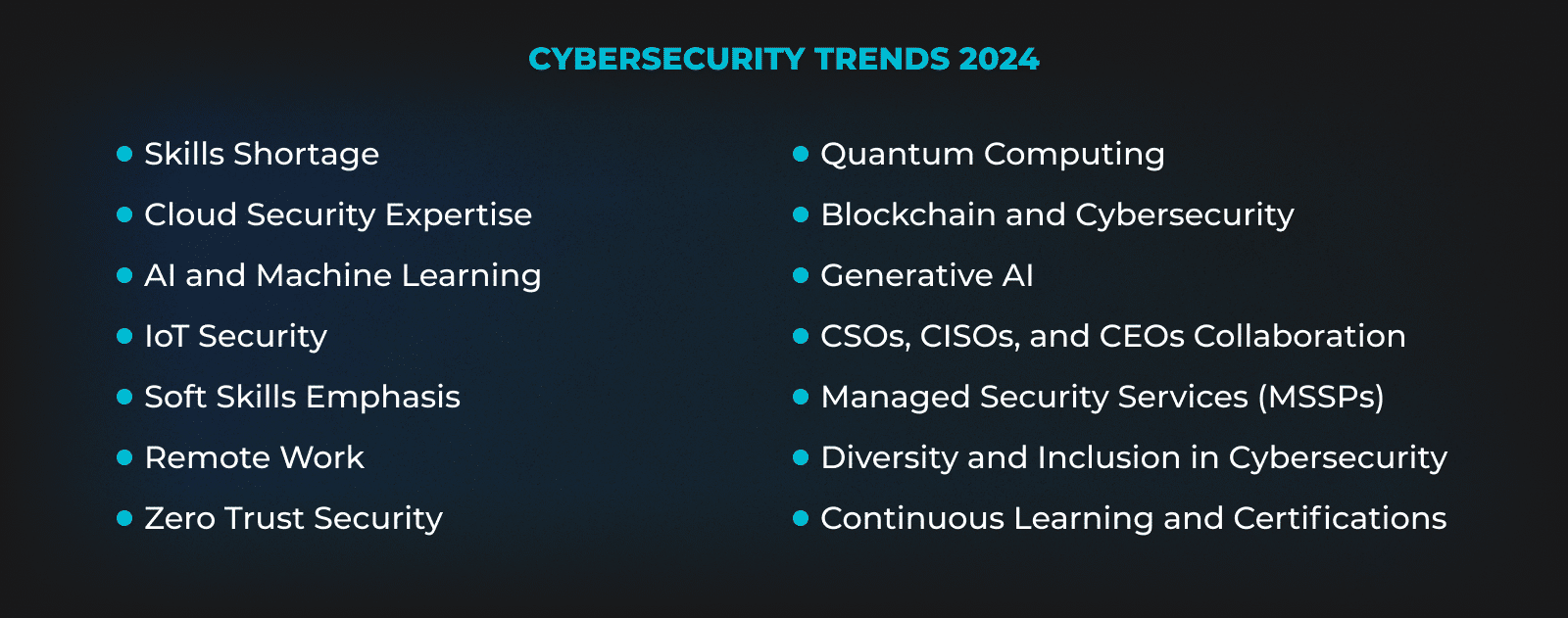Trends In The Cybersecurity Industry To Watch For In 2024
The cybersecurity industry is growing rapidly. Studies anticipate its global revenue to reach USD 273.60 billion by 2028 — a 10.56% increase over four years. This expansion is driven by the rise in cyber threats and the push towards digital transformation.

Looking into 2024, we’re seeing key trends that promise to reshape how we approach cybersecurity. First off, there’s a big move towards using artificial intelligence (AI) and machine learning to get better at spotting and responding to cyber threats. At the same time, as more people work remotely, cloud security is becoming crucial for keeping company data safe. And, we’re also seeing a shift towards zero-trust architectures, a strategy that helps prevent insider attacks and strengthens the overall security of digital systems. These trends and more highlight the changing landscape of cybersecurity.
Dive in for more insights on top cybersecurity trends.
TOP Trends in Cyber Security
Here are fourteen cyber security industry trends that we can anticipate in the coming months.

AI and Machine Learning
One of the biggest trends of 2024 is the increasing integration of Machine learning (ML) and artificial intelligence (AI) technologies into cybersecurity. In fact, according to one survey, 45% of businesses have already integrated AI and ML into their cybersecurity systems.
AI and ML boost can swiftly detect and respond to threats by analyzing large datasets and identifying patterns. They address issues like advanced persistent threats, real time malware, and anomaly detection, and automate routine tasks, thereby enhancing overall cybersecurity defenses.
Nevertheless, there are challenges in using AI and ML in cybersecurity as hackers may use these tools to launch complex attacks that get over conventional defenses. For adoption to be effective, experts in the creation, implementation, management, and security of these technologies will be needed, potentially creating an increased demand for data scientists, machine learning engineers, and AI specialists with a focus on cybersecurity.
Cloud Security Expertise
The rapid adoption of cloud computing has added new security challenges to cybersecurity: data breaches, unauthorized access, and misconfiguration. According to the Cost of a Data Breach Report 2023 by IBM, 82% of breaches involved information stored in the cloud, highlighting the growing importance of investing in cloud security. While cloud service providers (CSPs) are essential to protecting infrastructure, businesses are ultimately responsible for securing their data.
As a result, organizations will in all likelihood invest more in the coming months to recruit individuals with expertise in cloud security design and administration. These are professionals who have thorough know-how about the specific risks associated with cloud environments and can put effective security rules in place to ensure visibility in hybrid environments and secure data as it flows between clouds, databases, and applications. Consequently, the demand for cloud security specialists is expected to rise, potentially leading to competition for experienced professionals in this field.
Zero Trust Security
One of Forbes’s top cybersecurity trends 2023, Zero Trust Security has enjoyed tremendous interest in recent years, a trend that is likely to continue in 2024.
Unlike traditional security features that rely on perimeter defenses, Zero Trust assumes that no entity, whether inside or outside the network, should be trusted by default. It focuses on authenticating every person and tool trying to access sensitive records, regardless of their location or network. Already, 61% of organizations have a Zero Trust initiative, and 35% plan to implement one soon, according to Okta’s The State of Zero Trust Security 2023.
As organizations increasingly push for zero-trust security, there may be an increasing demand for professionals with expertise in identity and access management, network segmentation, and continuous monitoring. The market for these professionals is sure to evolve with increasing adoption.
IoT Security
The popularity of the Internet of Things is soaring, and according to the experts at Kaspersky, the number of global IoT devices will likely exceed 29 billion by 2030. Unfortunately, this growth will also increase the opportunity for cyber-attacks. A wide variety of IoT gadgets are an easy target for fraudsters seeking unauthorized access or attacks due to the lack of strict security measures. These gadgets are at risk of being used for DDoS attacks, and unauthorized access. For example, in the first half of 2023, Kaspersky’s analysts found over 700 ads for DDoS attack services tied to IoT botnets.
To mitigate these risks, companies in the IoT sphere will need more specialists to design and implement secure IoT solutions, causing the IT talent market to experience a surge in demand for professionals skilled in these areas.
Generative AI
Generative AI, a cutting-edge technology that creates new content such as text, images, and videos, is one of the growing trends in cybersecurity in 2024. While GenAI has great potential, it also poses security risks. Cyber attackers can manipulate this technology to create convincing phishing emails, deeply fake movies, and various social engineering attacks. In fact, according to a UK government assessment, GenAI is expected to increase the risk of fraud, scams, impersonations, cyber-attacks, and child sexual abuse by 2025.
On the plus side, AI is being used to generate security policies and enhance threat detection. As we move further into 2024, experts will focus more on exploiting the positive aspects of GenAI. This will warrant a talented pool of professionals who understand the dangers associated with generative AI, capable of developing and deploying AI-powered cybersecurity solutions. This demand will lead to increased opportunities for experts in AI and machine learning.
Blockchain and Cybersecurity
Blockchain technology has gained traction in recent years. It provides a unique and criminal-resistant approach to robust security, minimizing vulnerabilities, ensuring strong encryption, and enhancing data ownership and integrity verification. It can eliminate the need for some passwords, a common weak point in cybersecurity, accounting for over 80% of incidents in small to medium-sized businesses (SMBs). This makes it an excellent choice for secure data storage and transactions. It also removes reliance on intermediaries and central authorities, reducing the risk of data breaches and unauthorized access.
In the coming months, organizations will increasingly adopt blockchain for cybersecurity, strengthening the overall security landscape. However, the growing demand for experts skilled in both blockchain and cybersecurity is expected to follow this trend.
Quantum Computing
As digital technology advances, cyber threats evolve. Quantum computing, for example, with its effective processing capabilities, could potentially break conventional encryption used in cybersecurity. This poses a significant threat to sensitive data. On the plus side, it also opens opportunities for new cryptographic techniques that resist quantum attacks.
While the risk may not be immediate, (The Cloud Security Alliance estimates vulnerability for RSA, Diffie-Hellman, and Elliptic-Curve Cryptography from April 2030) companies need to prepare for the impact of quantum computing on cybersecurity as early as 2024 by investing in quantum-resistant technology and developing sophisticated encryption techniques that can withstand the power of quantum computing, ensuring the confidentiality and integrity of information. This will create a demand for specialists in post-quantum cryptography and quantum-safe encryption, making expertise in quantum computing valuable in the talent market.
CSOs, CISOs, and CEOs Collaboration
Cybersecurity has evolved from being simply a matter for IT. It has become a concern that requires attention from top-level executives. In fact, one of the current cybersecurity trends is for Chief Security Officers (CSOs), Chief Information Security Officers (CISOs), and Chief Executive Officers (CEOs) to collaborate closely to ensure that evolving threats are handled appropriately. This collaboration recognizes the crucial role security leaders play in major decision-making processes. It emphasizes that the CISO position cannot operate alone, and working closely with the C-suite can help address today’s security challenges while improving overall business operations.
For this collaboration to thrive, experts must possess not just technical cybersecurity capabilities but also unique people skills. This trend will potentially result in a higher need for cybersecurity specialists with a broader skill set, including commercial acumen, communication, and leadership abilities.
Managed Security Services (MSSPs)
An increased reliance on managed security services (MSSPs) is one of the cybersecurity trends 2024 to look out for. MSSPs provide a broad variety of security services, including vulnerability scanning, threat intelligence, risk management, and incident response. This guarantees constant monitoring and defense, addressing the growing cyber risks faced by businesses.
Research shows that 65% of organizations experience advanced security by partnering with an MSSP. Outsourcing security capabilities allows companies to focus on their core competencies while leveraging the specialized knowledge and resources of these third party providers. This trend enables increased protection even for smaller organizations that lack in-house cybersecurity talent. There may still be the need for someone who can manage and oversee relationships with MSSPs, ensuring that the outsourced security measures align with the organization’s specific needs.
Skills Shortage
One of the most significant cyber security trends of 2024 is the ongoing skills shortage. The demand for experts consistently surpasses the available talent pool, creating ongoing scarcity. According to a recent estimate, there is currently a global shortage of 3.4 million cybersecurity professionals.
This shortage may be attributed to several causes—the rapid evolution of technology, the ever-changing threat landscape, and a lack of cybersecurity-focused educational programs. The result? An increased risk of unknown vulnerabilities, longer incident response times, and increased cyberattack risk. It has also increased competitiveness in the labor market, resulting in higher rates for experts.
To address this situation, companies need to modify their techniques to prioritize upskilling and reskilling. This approach adapts current employees to meet the evolving demands of the cybersecurity landscape.
Soft Skills Emphasis
Another of the trends in cyber security gaining significant traction in recent years is the emphasis on soft skills. Professionals must now possess certain essential skills in addition to their technical expertise. According to Statista, communication, leadership, and flexibility were among the top skill needs for cybersecurity workers worldwide in 2023.
Soft skills are crucial in incident response, crisis management, and communicating security policies across organizations. Effective communication fosters a security-aware culture within the company. Cybersecurity experts must comprehend the technical aspects of cyber threats and also communicate well with various teams in the organization. This growing trend will likely lead to a higher demand for cybersecurity professionals with strong communication and collaboration skills across different departments.
Diversity and Inclusion in Cybersecurity
The drive for diversity and inclusion in cybersecurity will gain traction in 2024. Historically, cybersecurity personnel have primarily been white and male. Women account for around 24% of this industry, emphasizing the importance of encouraging diversity.
To this end, more and more organizations will be actively working towards creating a more inclusive workforce. Not only is this the most effective strategy to encourage creativity and problem-solving, but it also solves the company’s skills gap. Businesses can enhance their cyber defenses and foster meaningful industry interchange by using a larger pool of talent that includes women, ethnic minorities, and individuals from varied backgrounds.
Continuous Learning and Certifications
The cybersecurity threat landscape is expanding every day. To keep up, cybersecurity workers must engage in ongoing learning and certifications, which will become increasingly popular in the coming months. The majority of cybersecurity specialists, 91%, believe that reskilling and staying on top of cybersecurity latest trends is critical for their organizations to remain competitive.
Continuous learning enables experts to stay informed about new threats, allowing them to implement powerful safety features. Certifications provide a standardized way to validate skills in unique cybersecurity areas. Companies highly value professionals who invest in ongoing learning and possess relevant certifications. As a result, the job market may experience increased demand for individuals committed to updating their skills. Organizations may also need to invest in training programs to ensure their cybersecurity teams remain up-to-date.
Remote Work
The rise of remote work in recent years has sped up, and cybersecurity strategies must adjust accordingly. Remote work offers a broader talent pool for organizations to hire professionals, breaking down geographical barriers. This allows access to diverse perspectives and a wider range of talent from around the world.
On the other hand, it has also expanded the potential for cyber attacks with risks like unsecured home networks and increased phishing threats. Stats reveal the impact: 63% of businesses faced data breaches due to remote work, 80% saw a surge in email phishing attacks, and 68% expected to encounter more cybersecurity challenges. To tackle this, companies need cybersecurity experts versed in remote work intricacies, especially in areas like remote access security, endpoint protection, and VPN technologies. The demand for these specialists is likely to grow.
These trends will not only shape the future of cybersecurity in 2024, they will also influence your organization’s talent strategy.
How Staff Augmentation Can Help Keep Up With These Trends
Staying on top of the latest cybersecurity trends requires the right expertise, and IT staff augmentation is your key to accessing this expertise. At Newxel, our cybersecurity staff augmentation service makes it easy for you to swiftly access specialized skills not readily available in your local talent pool from anywhere in the world. This flexibility ensures that your organization can effectively address emerging threats and challenges.
In 2022, we started a promising collaboration with AlgoSec, a leading cybersecurity enterprise in network security. AlgoSec sought to expand its team of deployment engineers, requiring three to four professionals with specific technology expertise. We decided to look towards the Turkish market for the right candidate. This was a new terrain for us at Newxel and AlgoSec, but it was a strategy that paid off.
Within a month, we hired and onboarded the first specialist, which later evolved into a team of three top-tier deployment specialists that met AlgoSec’s high standards. The client was impressed not only by our Turkish team’s expertise but also by our high-level service delivery.
Our comprehensive services for AlgoSec included team hiring, onboarding support, people management, equipment provision, IT support, legal and financial services, and more. This success story underscores our commitment to assisting clients in building world-class teams for innovation and success.
Conclusion
The landscape of cybersecurity is evolving, encompassing everything from AI-driven threats to the necessity of zero-trust frameworks. As a result, keeping up with new security trends is essential rather than merely an option. But, you can confidently traverse this uncertain digital terrain if you have the proper professionals on your team. This is where Newxel can help. We can help you build a dedicated cybersecurity team to safeguard your organization.
Contact us today to discuss your requirements and keep your organization secure in the dynamic cybersecurity landscape.






